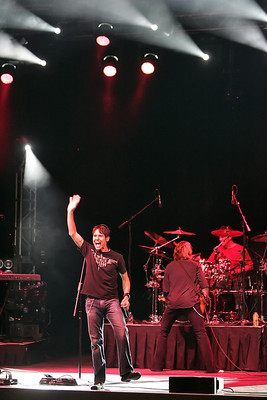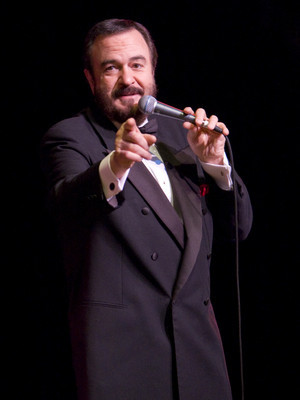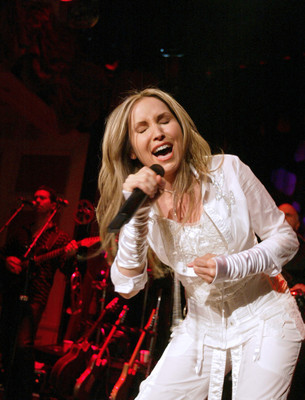It’s tougher these days for lounge acts to land recurring gigs
Thirty years ago, when Jerry Tiffe played the Sands, he performed in the hotel's lounge with two other acts with whom he'd alternate spots on the bill each night.
Each performer worked six nights a week and, on nights when one of the acts was off, a relief band filled in, Tiffe recalls.
Today's loungegoer would drool at the prospect of seeing such riches in talent on the same bill seven nights a week. These days, the double whammy of fewer lounges and pared-down show schedules can make it difficult for aspiring performers seeking to carry on the rich tradition established by such Las Vegas legends as Louis Prima, the Mary Kay Trio and Freddie Bell.
"When I first moved to Las Vegas, wow," recalls Dian Diaz, who in December celebrated her 10th anniversary at Bellagio's Fontana Lounge. "I loved it. You could go to one casino, and in one casino they had three lounges.
"It was so cool. You could jump from lounge to lounge to see great acts and really top-of-the-line groups."
For a performer, "that's what made it easy," Diaz says.
But, today, there are "a lot of variations to night life that weren't really there a few years ago," Diaz notes, including "the ultralounge, which has taken a big part of the audience that used to be catered to (in lounges) as far as the live music scene."
Tiffe, who plays afternoon shows at Aliante, Palace and Boulder Stations and Arizona Charlie's, says the trend of Strip-based nightclubs also has helped to siphon away younger patrons who, previously, would have sated their thirst for musical entertainment at lounges.
Hotels began "spending big money on nightclubs," Tiffe says, "and what happened is, the DJ becomes the guy who's moving the room, not a band."
"When I started doing this 15 years ago, lounges were very different than they are now," agrees Judy Alberti, vice president of entertainment for Station Casinos. "The really popular lounge acts performed six nights a week, and it was a very good living, actually."
Today, Station Casinos continues to offer a sizable roster of lounges at its locals-oriented properties, all featuring acts that help to create throngs of loyal regulars. But, Alberti says, "I think once you open a nightclub and see the revenue it does on the Strip, that's a lot of real estate in a lounge you might be rethinking."
The bottom line: For performers, landing, and keeping, a lounge gig isn't as easy as it used to be.
Glenn Medas, president of Platinum Productions, whose roster of acts includes Sin City Heat, which performs at the Las Vegas Hilton, says many lounge musicians augment their lounge earnings by teaching music during the day, moonlighting in production shows that feature live music or working for more than one group. "Or, some of them are having to get out of town and get (a job on) a cruise ship."
Brody Dolyniuk, frontman of Yellow Brick Road, a classic rock tribute band that has developed a loyal following playing Station Casinos properties, says the band even now performs "quite a bit" at corporate events, including one show at the MGM Grand for 14,000 McDonald's managers.
"In Las Vegas, there's a lot of corporate work," says Dolyniuk. "We try to space those around our regular work schedule."
Dolyniuk, who remembers Yellow Brick Road's days traveling the lounge circuit both here in town and in places such as Wendover, says the band still plays select out-of-town dates in such locales as Phoenix.
Dolyniuk, himself, also takes side jobs, "not so much because I need to, but because I've been involved in some projects," he says, including recording cover songs for the video games "Guitar Hero 3" and "Rock Revolution."
Medas says the changing Las Vegas lounge landscape mandates that performers' management be creative, too. For example, Medas says talent buyers who book Rich and Famous -- an act he assembled whose credits include dates at Green Valley Ranch -- for four nights can receive a fifth night for free plus a complimentary corporate or private show.
And, in a constantly evolving entertainment landscape, performers have to evolve as well.
"You have to be constantly reinventing yourself," Diaz says, noting that she and her group rehearse "no less than two or three (new) songs a week."
That's because audiences are always changing, Diaz says. "I mean, I can do an all-rock set if I need to, I can do a Latin set if I need to, I can do a Motown set if I need to, depending on the audience."
But, challenges notwithstanding, Alberti says that, just as it did in the Las Vegas lounge's heyday, a good lounge act offers audiences something that can't be duplicated by DJs playing recorded music.
"That's why we have a lot of luck with classic rock and '80s glam rock, because you cannot re-create that experience in a nightclub," she says.
"My prediction is," Dolyniuk says, "people are always going to have a hunger for live entertainment and the live music and the energy that comes off the stage, rather than a CD spinning in a machine.
"That's not meant to be an insult," he adds. "But that's my opinion and that's what's in my heart."
Contact reporter John Przybys at jprzybys@reviewjournal.com or 702-383-0280.

















